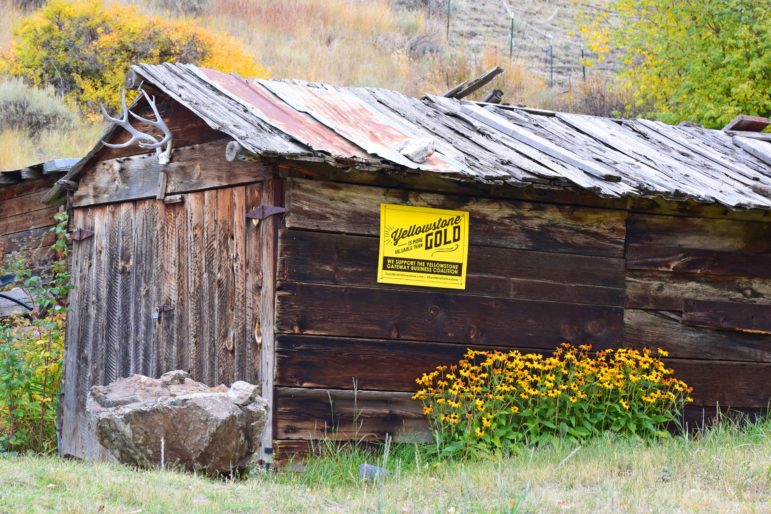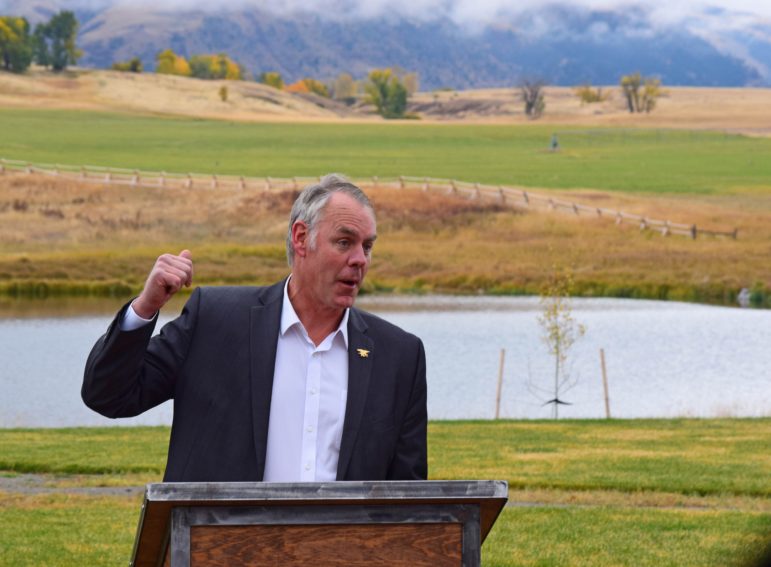
EMIGRANT, MONT. — Acting on a recommendation last month from the U.S. Forest Service, Interior Secretary Ryan Zinke on Monday announced the withdrawal from mining for 20 years of more than 30,000 acres of federal lands in southwest Montana.
Saying that “there are places to mine and places not to mine,” Zinke said Montana’s Paradise Valley, just north of Yellowstone National Park, was the kind of place where new large-scale mining wasn’t appropriate.
The move extends a two-year moratorium on new mining claims in portions of the Custer Gallatin National Forest put in place by the Obama administration in 2016. Existing claims would not be affected.
Several business leaders were on hand for a signing ceremony, and to praise the decision, saying that mining could jeopardize the tourism and outdoor recreation that are key drivers of the local economy.
“We all depend on this tourism, and the sustainable economy in this valley is the envy of the state,” said Bryan Wells, a longtime resident of Emigrant, whose businesses range from pumping septic tanks to vacation rental properties.
Wells, a pro-business conservative who said he has generally held “not in my backyard” types in low regard, found himself joining with a range of politically diverse locals to form the Yellowstone Gateway Business Coalition. The group has been active over the last three years in building opposition to new mining on public lands at the doorstep of Yellowstone.
Two companies have been planning mining operations on private lands in the area, and local business leaders said they worried that success in those efforts would lead to large-scale operations on public lands.
The U.S. Forest Service — an agency within the Agriculture Department — reviews and administers surface activities on public forest lands in the area. But he U.S. Bureau of Land Management — an agency in the Interior Department — controls the subsurface mineral rights.

Lucky Minerals, a Canadian mining company, had announced plans to start exploratory mining operations in Emigrant Gulch, an area the company’s website states “could potentially host a multi-million ounce gold deposit.”
Locals opposed to mining said they expect that Lucky Minerals would seek to expand mining onto public lands if its small-scale efforts were successful, and they feared how those operations might affect landscape that is home to grizzly bears, Canada lynx and other wildlife. The Yellowstone River, a popular and scenic trout fishery that is economically vital to the region, also flows through the area.
In a scene that was a switch from the usual dynamic in such circumstances, Lucky Minerals President and CEO John Mears stood along the roadside outside Monday’s press conference holding a protest sign and speaking with reporters.
Mears said he was “not thrilled” with the mining withdrawal, but said the decision “doesn’t really affect us.” Permits are in place and plans will move forward next year to begin exploratory work on 220 acres of private land, Mears said.
He said “the vast majority of the locals here support us,” and criticized opposition efforts by what he said were a group of wealthy elites.
But Lucky Minerals has had virtually no presence in the area, and many locals say opposition to new mining was diverse and widespread.
“A majority of people in the valley are not in favor of it and are very passionate in their positions,” said Brian Sullivan, food and beverage manager for Sage Lodge, which hosted the signing ceremony.
Michelle Uberuaga, executive director of the Park County Environmental Council, said opposition to mining in the valley grew out of a grassroots effort that spread over the last three years through conversations and meetings at coffee shops, breweries, fly shops, backyard barbecues, baseball games and beyond.
Uberuaga said the effort boiled down to “letting the virtues of this place speak for itself.”
Zinke said he thought it was unlikely Lucky Minerals would move forward with mining plans on private land in face of the withdrawal of public lands.
“I don’t see a path forward,” he said.
Zinke cited his tenure as a Montana congressman immediately prior to his appointment as Interior Secretary as instrumental in informing him about what he said was widespread opposition from locals and elected officials to new mining in the picturesque valley that is home to a mix of ranchers, recreationists, conservationists, working class residents and wealthy landowners.
Congressional action is required to enact a permanent ban on new mining on public lands in the area, Zinke said, a move he supported. He was limited to a 20-year withdrawal by restrictions on his authority.
“It was the right decision,” he said.
Contact Ruffin Prevost at 307-213-9818 or [email protected].
